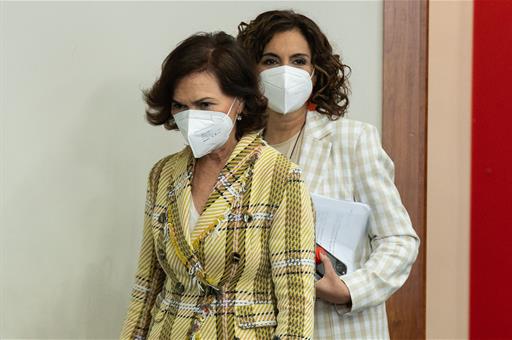Government of Spain approves social, health and legal measures to be applied at the end of the COVID-19 state of emergency
Council of Ministers - 2021.5.4
Moncloa Palace, Madrid
The Royal Decree-Law approved today in the Council of Ministers gives legal support in time to many of the exceptional measures approved over the last year to address situations of vulnerability caused by the COVID-19 health, economic and social crisis.
The First Vice-President of the Government of Spain and Minister for the Presidency, Parliamentary Relations and Democratic Memory, Carmen Calvo, has stated that - with this new regulation - the Government "has prepared exiting from the state of emergency responsibly, preventively, and with consideration and efficiency in coordination with other public administrations".
Urgent measures in social, health and legal fields
Social measures
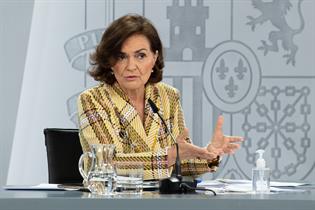 Foto: Pool Moncloa/Borja Puig de la BellacasaThe regulation approved today provides that the current deadline for guaranteeing the supply of water, electricity and natural gas to vulnerable consumers and the social bonus to its recipients will be extended until 9 August.
Foto: Pool Moncloa/Borja Puig de la BellacasaThe regulation approved today provides that the current deadline for guaranteeing the supply of water, electricity and natural gas to vulnerable consumers and the social bonus to its recipients will be extended until 9 August.
Protection measures in situations of housing vulnerability will be maintained until the same date, including the possibility of requesting a moratorium or partial cancellation of the rent for housing when the landlord is a large-scale landlord or public entity, or the suspension of evictions of economically and socially vulnerable households from their usual residence.
The consideration of public services for victims of all forms of violence against women as essential services is extended for another three months, and autonomous communities and cities are empowered to allocate the funds they are entitled to from the State Agreement against Gender Violence to their own programmes in this regard.
The meetings of owners' associations under the horizontal property regime will not have to be convened before 31 December 2021, although the possibility of holding them in person is established and regulated provided that certain requirements are met.
Health measures
Other health measures include controls at ports and airports on passengers arriving in Spain, to rapidly detect the presence of imported cases of COVID-19, and extending the possibility of relying on retired health professionals during the pandemic, guaranteeing the compatibility of their pensions.
Decision-making capacity of the autonomous communities
Following the end of the exceptional period of the state of emergency, Carmen Calvo has assured that the legislative health framework will continue, allowing autonomous communities to respond to the pandemic and to take protective decisions, including those affecting fundamental rights and public liberties, with the corresponding legal authorisation or ratification by the High Courts of Justice or the National High Court.
With regard to these judicial decisions - and with the aim of ensuring that the legislation is applied uniformly throughout the national territory - the Royal Decree-Law approved today introduces the possibility of lodging an appeal in cassation before the Supreme Court to establish jurisprudence. The procedure shall be swift, simple and preferential.
The first vice-president thanked judges and the courts for "their contribution, in their part, to protecting the health of our compatriots".
Pandemic situation and pace of vaccination
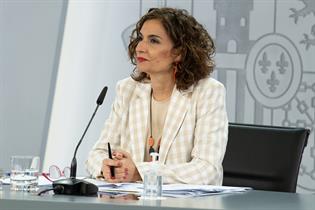 Foto: Pool Moncloa/Borja Puig de la BellacasaThe Minister for the Treasury and Government Spokesperson, María Jesús Montero, has stated that the epidemiological data from COVID-19 shows that the cumulative incidence rate in most of the autonomous communities is falling, which confirms that "the vaccination campaign is really obtaining good results".
Foto: Pool Moncloa/Borja Puig de la BellacasaThe Minister for the Treasury and Government Spokesperson, María Jesús Montero, has stated that the epidemiological data from COVID-19 shows that the cumulative incidence rate in most of the autonomous communities is falling, which confirms that "the vaccination campaign is really obtaining good results".
She also indicated that more people were vaccinated in Spain in April than in the previous three months combined. Five million people have received the full course and twelve million have been given the first dose.
The spokesperson highlighted the intense work of the health workers to meet the government's target: 70% of the population being vaccinated by August.
Limitation of flights from Brazil and South Africa
The Government has approved the seventh extension of the 2 February agreement limiting flights from Brazil and South Africa to Spanish airports to combat the spread of COVID-19.
María Jesús Montero has detailed that the measure will be in force from 00:00 hours on 11 May until 00:00 hours on 25 May (mainland time). Certain exceptions to the restrictions are maintained, such as those relating to flights by Spanish citizens or residents in Spain.
She also pointed out that, in the case of people from India, a ministerial order requires the presentation of a negative PCR test carried out at origin and a period of quarantine.
"Green Passport"
In relation to the digital vaccination certificate, Montero explained that the European Union is studying the possibility of citizens who have completed their vaccination course - with any of the vaccines approved by the European Medicines Agency - being able to move freely within its territory. This also applies to citizens of countries with an infection rate of under 100 cases per 100,000 inhabitants.
Montero affirmed that Spain's position - with all the guarantees and precautions in place - has always been in favour of promoting safe mobility between countries whose cumulative incidence is at acceptable levels, regardless of whether people have to prove vaccination or some other requirement.
Promoting the audiovisual industry
The Council of Ministers created an inter-ministerial working group to coordinate the promotion, cooperation and evaluation of the 'Spain: European audiovisual hub' plan, which was presented on 24 March.
María Jesús Montero explained that the aim of the plan is to promote national production, attract investment, improve competitiveness, support Spanish talent and reduce the gender gap. Its specific goal is to increase audiovisual production in Spain by at least 30%.
The plan is one of the components of the Recovery, Transformation and Resilience Plan and foresees public investment of 1.603 billion euros for the period 2021-2025.
Armed Forces and Civil Guard positions
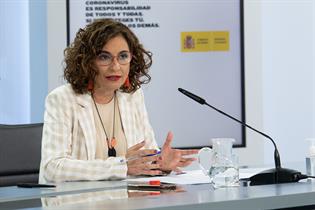 Foto: Pool Moncloa/Borja Puig de la BellacasaThe Executive has approved the annual provision of positions to access the military training centres of the Armed Forces and the Officers' Rank of the Civil Guard for 2021.
Foto: Pool Moncloa/Borja Puig de la BellacasaThe Executive has approved the annual provision of positions to access the military training centres of the Armed Forces and the Officers' Rank of the Civil Guard for 2021.
In the case of the Armed Forces, 1,920 places are authorised for entry into military training centres. In addition, to promote job stability, 1,000 permanent contract positions are available for troops and sailors and a further 72 for complementary military personnel, as well as a maximum of 250 places to access voluntary reservist status.
As for the Civil Guard, 65 places are authorised to access the Officers' Rank, thus maintaining the number that has been offered each year since 2010.
Entry and Promotion Regulations of the Armed Forces
The Executive has approved the regulation on Entry and Promotion in the Armed Forces, which updates the requirements and procedures for entry into military training centres.
María Jesús Montero has indicated that the measure aims to boost the promotion of those who make up the rank of non-commissioned officers and the rank of troops and sailors, thus making the most of the capacity, acquired skills and prestige of Armed Forces personnel.
The Regulation facilitates access for non-commissioned officers of all corps and ranks to the qualifications required to enter officer training centres, establishing a programme for obtaining university degrees in collaboration with the National Distance Education University (UNED). In addition, the maximum age limits to enter all Common Corps, as well as the Quartermaster and Engineer Corps - of the Army and the Navy - are abolished.
On the other hand, the regulation requires the Compulsory Secondary Education diploma to enter the ranks of troops and sailors, includes specific measures to protect maternity in the development of the entrance exams and promotes digital transformation in the search for talent and the selection and evaluation of personnel.
Appeal of unconstitutionality against the law for the protection and management of the coast of Catalonia.
The Government Spokesperson has specified that the Council of Ministers has agreed to lodge an appeal of unconstitutionality against two articles of the law of the Autonomous Community of Catalonia 8/2020, on the protection and planning of the coastline, considering that it undermines or encroaches on the Generalitat's own powers, which cannot be granted to local councils.
These two articles grant powers to local councils to authorise activities that are foreseen in the plans for the use of the coastline and beaches, such as sporting or cultural events or others with removable installations.
Honours
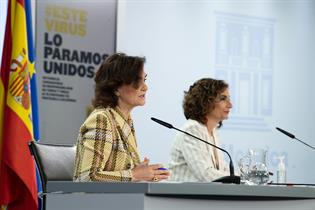 Foto: Pool Moncloa/Borja Puig de la BellacasaThe Government, at the proposal of its president, has awarded civil merit medals to David Beriáin and Roberto Fraile, the two journalists murdered in Burkina Faso, in recognition of their work in the service of information and communication.
Foto: Pool Moncloa/Borja Puig de la BellacasaThe Government, at the proposal of its president, has awarded civil merit medals to David Beriáin and Roberto Fraile, the two journalists murdered in Burkina Faso, in recognition of their work in the service of information and communication.
Both Carmen Calvo and María Jesús Montero emphasised that, throughout their extensive professional experience, both had carried out important news work in conflict zones "risking their lives in pursuit of the truth".
Current affairs
During the press conference following the Council of Ministers, María Jesús Montero announced that the President of the Government of Spain, Pedro Sánchez, will participate in a social summit on Saturday organised by the Portuguese Presidency of the European Council. In this forum, the spokesperson has advanced, she will defend the inclusion of the social pillar as an essential element in guaranteeing a fair, lasting and sustainable recovery.
The spokesperson also clarified that "the Government has neither decided nor done nor proposed" removing joint personal income taxation. Montero added that the government, in response to requests from Brussels, has set up a committee of experts for tax reform that will make proposals to the government to modernise the tax system and increase progressiveness and capacity.
Non official translation





